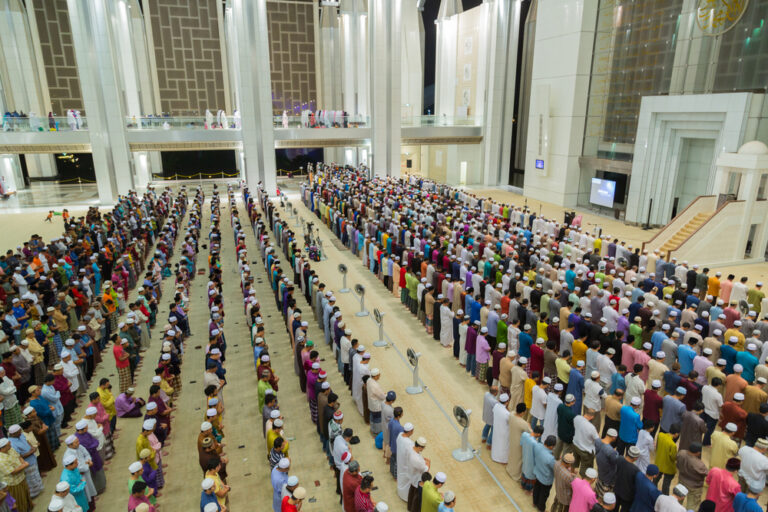By Khurshid Ahmad

George Bernard Shaw is reported to have said:
“I have always held the religion of Muhammad in high estimation because of its wonderful vitality. It is the only religion which appears to me to possess that assimilating capacity to the changing phase of existence which can make itself appeal to every age. I have studied him – the wonderful man – and in my opinion far from being an anti-Christ, he must be called the Saviour of Humanity. I believe that if a man like him were to assume the dictatorship of the modern world, he would succeed in solving its problems in a way that would bring it the much needed peace and happiness: I have prophesied about the faith of Muhammad that it would be acceptable to the Europe of tomorrow as it is beginning to be acceptable to the Europe of today.” (G. B. Shaw, The Genuine Islam, Singapore, Vol. I, No. 8, 1936.)
The question is what are those characteristics of Islam which have won millions of followers to the faith in the past and which make it so appealing to the modern age?
Some of the major characteristics of Islam are given in the following words.
1- Simplicity, Rationalism and Practicalism
Islam is a religion without any mythology. Its teachings are simple and intelligible. It is free from superstitions and irrational beliefs. The unity of God, the prophethood of Muhammad (peace be upon him) and the concept of life-after-death are the basic articles of its faith.
They are based on reason and sound logic. All the teachings of Islam follow from those basic beliefs and are simple and straightforward.
There is no hierarchy of priests, no far-fetched abstractions, no complicated rites and rituals. Everybody may approach the Book of God directly and translate its dictates into practice. Islam awakens in man the faculty of reason and exhorts him to use his intellect.
It enjoins him to see things in the light of reality. The Quran advised man to pray: ‘O, my Lord! Advance me in knowledge.’ (Taha 20:114)
It asserts that those who have no knowledge are not equal to those who have (39:9); that those who do not observe and understand are worse than cattle (7:179); that the meanings of revelation become manifest to those ‘who have knowledge’ (6:97) and ‘who have understanding’ (6:98); that ‘whosoever has been given knowledge indeed has been given an abundant good’ (2:269); that basic qualifications for leadership are, among other things, knowledge and physical strength (2:247) and that of all things it is by virtue of knowledge that man is superior to angels and has been made vicegerent of God on earth (2:30).
The Prophet of Islam said: ‘He who leaves his home in search of knowledge walks in the path of God.’ ‘To seek knowledge is obligatory for every Muslim.’ ‘Acquire knowledge, because he who acquires it in the way of the Lord performs an act of piety; he who disseminates it bestows alms and he who imparts it to others performs an act of devotion to Allah.’
This is how Islam brings man out of the world of superstition and darkness and initiates him into that of knowledge and light.
Then, Islam is a practical religion and does not indulge in empty and futile theorisings. It says that faith is not a mere profession of belief in Allah.
Religion is something to be lived, and not an object of mere lip-service. The Quran says: “Those who believe and act righteously, joy is for them, and a blissful home to return to.’ (Ar-Rad 13:29)
And the Prophet Muhammad (peace be upon him) said: ‘God does not accept belief, if it is not expressed in deeds, and does not accept deeds, if they do not conform to belief.’
Thus, Islam is a simple, rational and practical religion.
2- Unity of Matter and Spirit
A unique feature of Islam is that it does not divide life into water-tight compartments of matter and spirit. It stands not for life-denial, but for life-fulfilment. Islam does not believe in asceticism. It does not ask man to avoid things material. It holds that spiritual elevation is to be achieved by living piously in the rough and tumble of life and not by renouncing the world.
The Quran advises us to pray as follows: “Our Lord! Give us the good in this world and the good in the hereafter.” (Al-Baqarah 2:20)
Allah strongly censures those who refuse to benefit from His blessings. The Quran says: “Say (to them): By whose order have you denied yourself those amenities which God has created for His people and those good things to eat and use (which He has made for you)? (Al-A`raf 7:32)
Islam’s injunction is: ‘Eat and drink, but do not exceed (the limits of moderation and decency).’ (Al-A`raf 7:31)
The Prophet said: ‘A Muslim who lives in the midst of society and bears with patience the afflictions that come to him is better than the one who shuns society and cannot bear any wrong done to him.’
He said: ‘Keep fast and break it (at the proper time) and stand in prayer and devotion (in the night) and have sleep – for your body has its rights over you, and your eyes rights over you, and your wife has a claim upon you, and the person who pays a visit to you has a claim upon you.’
On another occasion he said: ‘These three things also are enjoined upon the faithful:
- to help others, even when one is economically hard-pressed;
- to pray ardently for the peace of all mankind; and
- to administer justice to one’s own self.’
Thus Islam does not admit any separation between ‘material’ and ‘moral’, ‘mundane’ and ‘spiritual’ life and enjoins man to devote all his energies to the reconstruction of life on healthy moral foundations.
It teaches him that moral and material powers must be welded together and spiritual salvation can be achieved by using material resources for the good of man in the service of just ends, and not by living a life of asceticism or by running away from the challenges of life.
The world has suffered at the hands of the ‘brilliant’ one-sidedness of many a religion and ideology. Some have laid emphasis on the spiritual side of life but have ignored its material and mundane aspects. They have looked upon the world as an illusion, a deception and a trap.
On the other hand, materialistic ideologies have totally ignored the spiritual and moral side of life and have dismissed it as fictitious and imaginary. Both these attitudes have spelt disaster. They have robbed mankind of peace, contentment and tranquillity.
Even today the imbalance is manifest in one or the other direction. Dr. De Brogbi, a French scientist, rightly says:
“The danger inherent in too intense a material civilization is to that civilization itself; it is the disequilibrium which would result if a parallel development of the spiritual life were to fail to provide the needed balance.”
Christianity erred on one extreme; the Modern Western Civilization, in both of its variants of secular capitalistic democracy and Marxist socialism, has erred on the other.
According to Lord Snell:
“We have built a nobly proportioned outer structure, but we have neglected the essential requirement of an inner order; we have carefully designed, decorated and made clean the outside of the cup; but the inside was full of extortion and excess; we used our increased knowledge and power to administer to the comforts of the body, but we left the spirit impoverished.” (Lord Snell, The New World, London: Watts & Co., 1947, p. 11.)
Islam aims at establishing an equilibrium between these two aspects of life – the material and the spiritual. It says that everything in the world is for man – but man himself is for the service of a higher purpose: the establishment of a moral and just order so as to fulfil the Will of God.
Its teachings cater for the spiritual as well as the temporal needs of man. Islam enjoins man to purify his soul and also to reform his daily life – both individual and collective – and to establish the supremacy of right over might and of virtue over vice.
Thus, Islam stands for the middle path and the goal of producing a moral man in the service of a just society. To be continued…
Source: This article is taken from the book of Islam: Its Meaning and Message, edited by Khurshid Ahmad, and published by the Islamic Foundation, third edition, 1999.
[opic_orginalurl]


